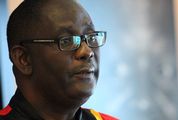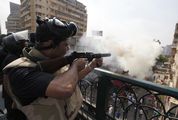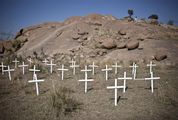
FORMER Nigerian president Olusegun Obasanjo led the African Union (AU) observer group that monitored the recent election in Zimbabwe. Asked about the poll, he noted that it was "free", "fairly fair", and asked for any evidence to show that the election lacked credibility. Some have, however, questioned Obasanjo’s own credibility to lead a team monitoring elections, given his chequered democratic record in Nigeria.
On the positive side, Obasanjo — who ruled Nigeria from 1976 to 1979 under a military junta — was only the third African leader to have handed over power voluntarily at the time. He fought bravely to keep Nigeria united during its 1967-70 civil war; became a roving international statesman after 1979, serving on the Commonwealth Eminent Person’s Group that visited South Africa in 1986; was imprisoned by Gen Sani Abacha between 1995 and 1998; and served as civilian president between 1999 and 2007, working with South Africa’s Thabo Mbeki to promote peace and development across Africa.
During Obasanjo’s tenure as a military leader, a draconian 1976 decree banned most strikes and allowed the detention of union leaders. The commune of antiestablishment Afro-beat musician Fela Kuti was brutally destroyed by Obasanjo’s soldiers a year later. The military regime killed demonstrating university students in 1978, closed several universities, and proscribed the National Union of University Students. Armed robbers were publicly executed.
Obasanjo was elected president of Nigeria in 1999 in a flawed election that was, however, seen as having generally reflected the wishes of voters. Even after the election, his military instincts never deserted him: he required that all but three of his cabinet ministers give him a signed but undated letter of resignation so as to keep them on a tight leash; his soldiers employed force to "pacify" the volatile areas of Odi and Gbeji; and he intervened in a gubernatorial contest to exclude a candidate he did not like.
Obasanjo’s relationship with his legislature was often fractious. Obasanjo reportedly interfered to influence the election of the senate president. On convening a meeting of both houses of parliament, he inappropriately sought to chair the meeting, before ordering senators out of the room so that he could talk to house members alone. The volatile Obasanjo eventually lost his temper and stormed out of the meeting. He purged the most senior members of his People’s Democratic Party in a party election of dubious credibility. Members of the House of Representatives — themselves scarcely paragons of moral rectitude — tried to impeach Obasanjo in 2002 for what they described as a failure to implement budgets, maintaining illegal accounts, disrespect for the rule of law, corruption and other "monumental inadequacies".
Obasanjo, however, survived and was re-elected president in 2003 in deeply flawed polls in which he won an implausible 99.92% of the vote in his home state. The elections were marred by violence and reports of widespread rigging. Reports of the bribing of legislators by presidential aides and kickbacks being paid to party members continued to swirl. Allegations of favouritism in the awarding of oil contracts persisted. In 2004, Obasanjo defied a supreme court order to release funding to the Lagos state government’s newly created local councils. Only part of the funding was disbursed, resulting in the chief justice condemning the president’s "clear contempt of the supreme court".
In 2007, Nigeria staged what was widely believed to be the most fraudulent election in its 47-year history. Ballot boxes were stuffed and stolen, voters were intimidated and results appeared out of thin air in areas where voting had clearly not taken place, particularly in the Niger Delta. Election tribunals later overturned the election of six governors and more than a dozen senators. Obasanjo’s failure to ensure a clean electoral process during two elections as president is one of the worst blemishes on his administration.
His unsuccessful and undignified attempt to change the constitution to run for a third presidential term badly damaged his democratic credentials and will remain the worst blot on his record. Obasanjo’s aides reportedly offered bribes to legislators; armed police broke up a meeting of politicians opposed to the third term; and state governors who failed to support the bid were threatened with impeachment. Despite Obasanjo’s denial of personal involvement in this sordid affair, then-US secretary of state Condoleezza Rice’s 2012 memoir confirmed that Obasanjo unsuccessfully sought president George Bush’s support for a third presidential term during a visit to Washington DC in 2006. Given this background, did Obasanjo have the credibility to serve as head of the AU’s electoral mission in Zimbabwe?
• Adebajo is executive director of the Centre for Conflict Resolution and author of The Curse of Berlin: Africa After the Cold War.




















Post a comment